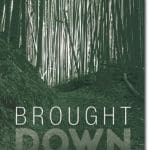A metal measuring spoon rests at the centre of the cover of James Pollock’s poetry collection, Durable Goods. The teaspoon is filled to overflowing with an ochre powder, most likely turmeric, and this minimalist overflowing characterizes the compact poems in this volume. Indeed, “Teaspoon” demonstrates Pollock’s wit on display in every quatrain of his measured poetry: “Its concave-convex bowl a funhouse mirror, / or two, in which the world appears upright / and upside down.” These mimetic double turns are held in place by the stanza’s structure and traditional rhyme and rhythms – a refreshing departure from contemporary free verse. Strategic caesuras track the inversions: “and upside down, and melting, in two blear / and mad illusions made by turning light.”
Pollock’s punctuation – whether through midline commas or enjambment – flips the spoon and mirror in the stanza. The second stanza furthers the illusion in historical hindsight, as “melting” turns to “molten bronze and gold” at the finale. A French simile de-familiarizes and sheds new light on this durable good. An “oeil de sorcière. Of yore / a status symbol, now a drudge.” The historical symbol reverses the durable drudge: the “stirring measurer does what it’s for, / immersed in cups of molten bronze and gold.” With its surfeit of wit, “Teaspoon” stirs and measures language, emotion, and meaning.
“Teaspoon” faces “Mirror” across the page, the sorcerer’s eye multiplying towards a mise en abyme – that infinite regress of back-to-back mirrors. “Mirror” begins and ends in the interrogative, a questioning of itself: “Only the precise truth in every part?” Synecdoche or the part for the whole is one of the keys to these poems, for each durable good forms part of a larger ensemble. The poet queries the mirror because the mirror questions us. Interrogative shifts to imperative: “Look again: words are spelled backward, and letters / reversed.” Reversal, pivot, and hinge rely on Pollock’s deft rhythm and punctuation. Mimetically, the mirror tells the truth; yet, in flattering, it lies. It exists as an object unto itself, yet comes into focus once we face it. Like utopia, it may be the best of places or no place at all. Through this looking-glass we have choice: “or let us say realism.” “Or” is one hallmark of these poems, negatives are another: “No / gate to some other world” … “not least because it frames what we can know.” The final question incorporates the negative: “Why not just tell the truth? The truth is why.” The chiasmus or reversal completes the mirror stage: the looking-glass is half-full and overflowing.
The opening poem, “Book,” sets the postmodern stage of meta-poetics and the process of creation itself. “The book remembers living in the wood, / roots in the earth, wet boughs in the sky.” Grounded in traditional rhyme scheme and iambic pentameter, the quatrain nevertheless awaits its playful turn from the chainsaw. The first stanza flows into the second with a twist. “So to die / for hinge and board and flyleaf, sheaves of word.” From wood to word, from hinge to flyleaf, from “die” to “dry heaven,” the poem concludes with a witty afterlife or post-pastoral contract between reader and writer: “or strange grove in which the author is a bird / and the reader the fresh wind that turns its leaves.” The “or” option becomes the hinge that turns the leaves of the book, original tree, and leavings of meaning.
The process of reading and writing reappears in the next poem, “Gooseneck Lamp,” with its sturdy stanzas of durable goods personified to come alive. Much factual detail leads up to the lamp, which doesn’t appear until the second stanza towards the end of a gooseneck periodic sentence. “Peering over your shoulder at your book / like a curious moon,” uses simile to expand the range of light and prepare for the other similes that follow in the poem. All of those “o” sounds give a sense of a halo of light and the gooseneck shape of the lamp: “its cone of light / blue as moonlight on the page, its long neck / craned attentively.” The lamp is a witness to reader and writer. Again the first stanza runs into the second successfully, “as if to write / itself into the story you are reading.” After the preliminary buildup, the spotlight finally appears: “the lamp, for all its brilliance, is discreet, / silent in fact, and placid in its pleading.” The lamp may be silent in fact, but its sound plays out in the early o’s that shift to long e’s in the second stanza, which ends with “Only by degrees do you feel its heat.”
The heat of the lamp is cooled in the next poem, “Ceiling Fan.” Once again Pollock makes us see both sides of the ordinary as he spins and stirs his objects and perspectives, always making the familiar a little strange, so that we notice it in a different light. His bifocal vision works best with a two-stanza structure, but occasionally he employs a single stanza or multiple stanzas. “Lawn Mower” is a lone quatrain that begins in the imperative to grab the reader’s attention: “Keep clear of this single-minded editor / laying the damp cut blades in long green rows.” A single stanza works for mower-editor: “It keeps the grass down. It’s a leveller. / Its mission is the only thing it knows.” Clipped sentences imitate the grass clipper that levels hierarchies through sharpened blade and wit.
Criticism of witticism applies to “Pencil,” which ends with “grinds it down,” to lead into the next poem, “Coffee Grinder,” which employs four quatrains. It begins with a simile: “Like a power tool or an artisan,” continues with “like a tornado siren,” and ends with “grounds that smell like thinking.” As stanzas fill with onomatopoeic sounds, the final simile comes as a surprise, an abstract of the artisan or epicurean thinking. Drinker and thinker are united through the grinding object that processes poetry.
The final poem, “Wind Turbine,” makes use of Shakespearean similes before concluding with “Make ready for the wind and it will come.” It is the same wind that begins the book, a correspondent breeze that animates mirrors and lamps, endures, and betters the goods. Like Prospero, Pollock invokes the elemental through the duration of these quatrains that transform the quotidian.
James Pollock is the author of Sailing to Babylon (2012), a finalist for the Griffin Poetry Prize and the Governor General’s Award in Poetry. His prizes include the Manchester Poetry Prize, the Magma Editors’ Prize, and the Guy Owen Prize from Southern Poetry Review. His other books include You Are Here: Essays on the Art of Poetry in Canada (2012) and The Essential Daryl Hine (2015). He grew up in southern Ontario, Canada, and is now Professor of English at Loras College. He lives with his wife and son in Madison, Wisconsin.
- Publisher : Signal Editions (Sept. 14 2022)
- Language : English
- Paperback : 80 pages
- ISBN-10 : 1550656104
- ISBN-13 : 978-1550656107
Michael Greenstein is a retired professor of English at the Université de Sherbrooke. He is the author of Third Solitudes: Tradition and Discontinuity in Jewish-Canadian Literature and has published widely on Victorian, Canadian, and American-Jewish literature.










